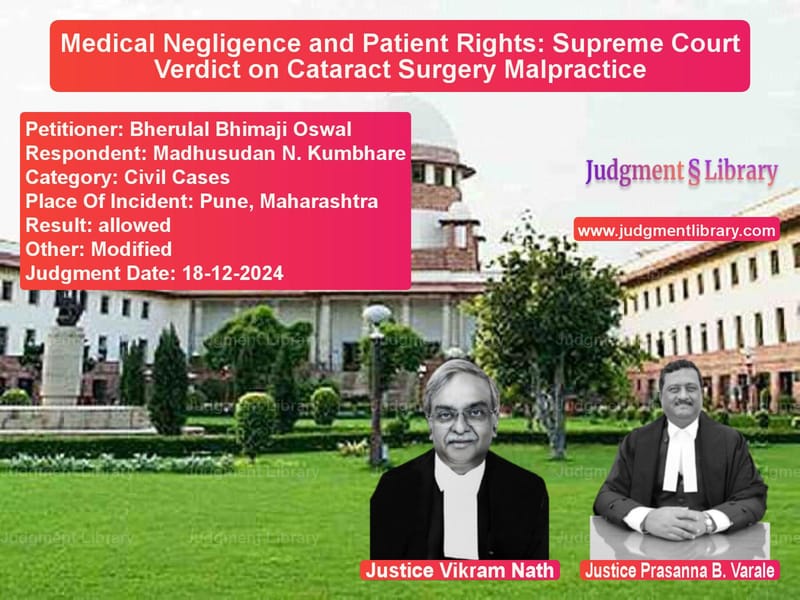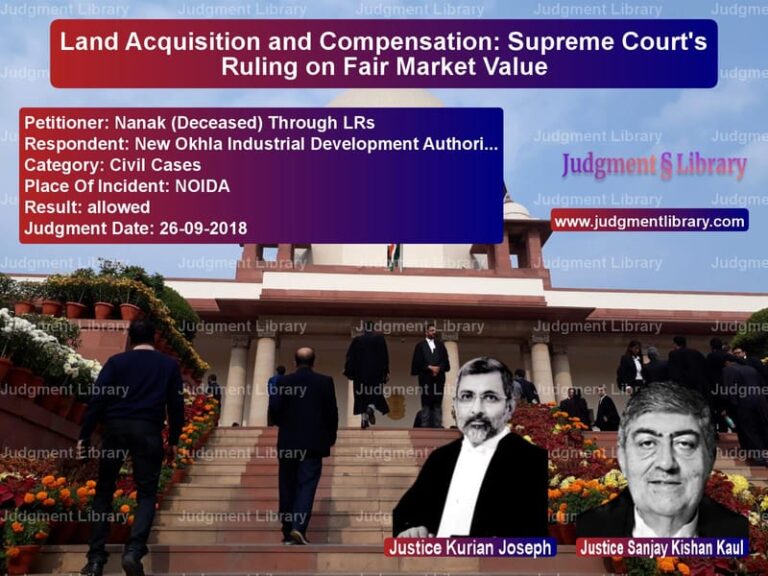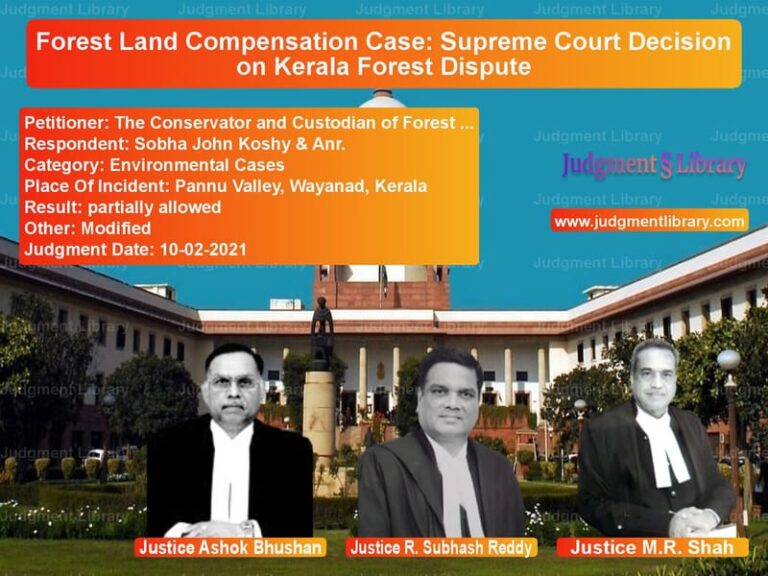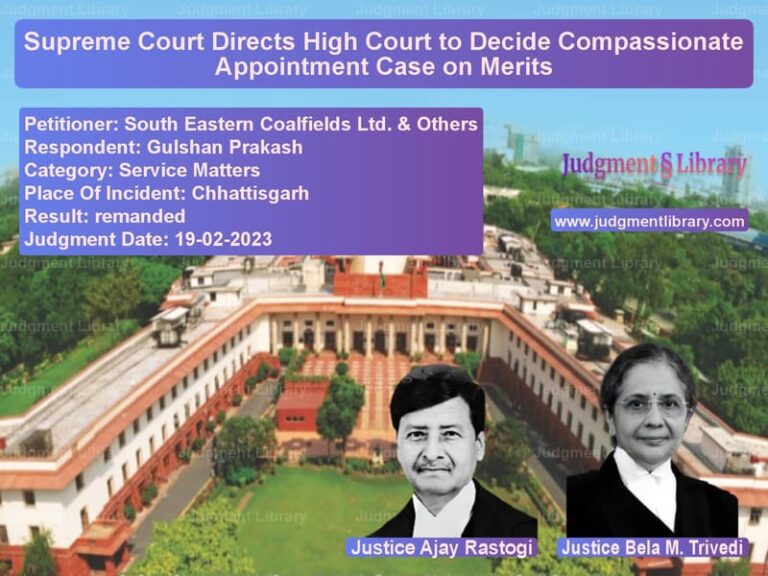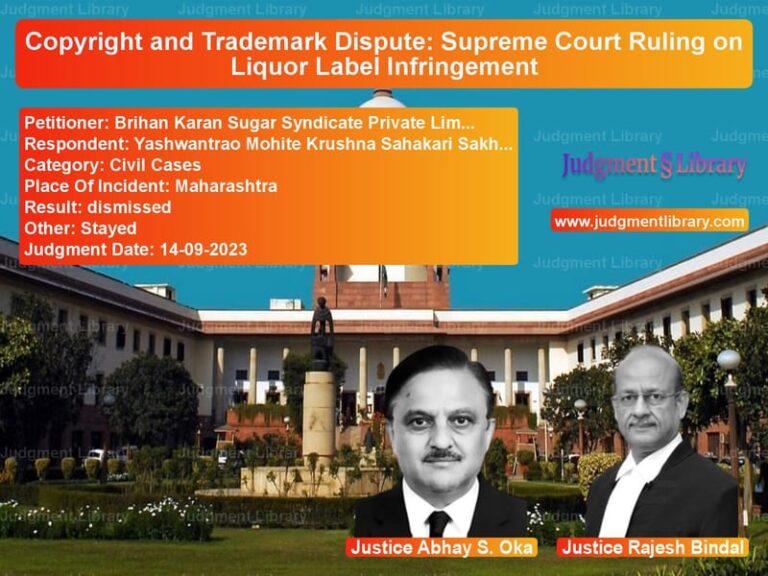Medical Negligence and Patient Rights: Supreme Court Verdict on Cataract Surgery Malpractice
The case of Bherulal Bhimaji Oswal vs. Madhusudan N. Kumbhare is a landmark judgment concerning medical negligence, patient rights, and compensation for malpractice under consumer protection laws. The Supreme Court analyzed whether negligence in a cataract surgery led to total vision loss for the patient, highlighting the obligations of medical professionals and the legal remedies available for victims of medical malpractice. This case has brought to light the issue of medical professionals’ responsibility to provide adequate post-surgical care and the need for timely intervention in critical cases.
Background of the Case
The dispute arose when Bherulal Bhimaji Oswal underwent cataract surgery at the clinic of the respondent, Dr. Madhusudan N. Kumbhare, in Pune. The operation took place on January 19, 1999, and the complainant was discharged the same night. However, he soon developed severe pain, eye irritation, and headaches that worsened over time.
Despite multiple follow-ups with the doctor, the complainant’s condition worsened, and he was eventually diagnosed with endophthalmitis—a severe post-surgical eye infection that resulted in complete vision loss. The complainant alleged that the doctor failed to provide proper post-operative care, resulting in the loss of his eyesight. The legal proceedings stemmed from the complainant’s claims that the surgery and post-operative care had been negligent and inadequate, leading to permanent injury.
The complainant contended that the doctor’s failure to treat the infection early on was the main reason for the eventual vision loss. Medical records showed a lack of adequate follow-up treatment and a delay in diagnosing the infection. The patient also highlighted the emotional and financial distress caused by his permanent disability, leading him to seek significant compensation.
Legal Proceedings
The complainant filed a case before the District Consumer Disputes Redressal Forum, Pune, seeking Rs. 10,00,000 in compensation for medical negligence. The claim was based on the following grounds:
- The doctor’s failure to diagnose and treat the post-operative infection in a timely manner.
- Negligence in performing the surgery, which allegedly caused the infection.
- Failure to provide proper medical advice after surgery, leading to further complications.
- Failure of the doctor to explain the potential risks of the surgery clearly, which would have allowed the complainant to make an informed decision about the procedure.
Despite these allegations, the District Forum dismissed the complaint, stating that no expert medical testimony was presented to prove negligence. The District Forum noted that the infection could have been a result of factors beyond the doctor’s control, including the complainant’s own actions during the post-surgery period. The ruling raised concerns about the need for concrete evidence in medical malpractice cases and how difficult it is to prove medical negligence without expert opinion.
State Commission’s Ruling
Aggrieved by the decision, the complainant approached the State Consumer Disputes Redressal Commission, Maharashtra, which was tasked with reviewing the decision made by the District Forum. The State Commission, after analyzing medical reports and expert opinions, concluded that:
- The doctor had indeed failed to diagnose and treat endophthalmitis in a timely manner, which resulted in the infection worsening.
- The infection should have been detected earlier, and proper treatment should have been administered to avoid further complications.
- Post-surgical care, which is critical for preventing infections, was not provided adequately.
- The complainant had not been adequately warned about the risks of infection and the need for post-operative care.
As a result, the State Commission ruled that the doctor was liable for medical negligence. The compensation awarded was Rs. 3,50,000 for pain, suffering, and medical expenses incurred due to the infection. This ruling also emphasized the importance of proper post-surgical care and the duty of medical professionals to ensure that patients are informed about the risks and required care post-operation.
Appeal Before the NCDRC
The case was further appealed before the National Consumer Disputes Redressal Commission (NCDRC), where both parties contested the ruling:
- The doctor argued that the infection was not caused by his actions or negligence but rather due to the patient’s failure to follow post-surgical instructions, such as not keeping the bandages on long enough after the surgery.
- The complainant sought a higher compensation, arguing that the damages awarded were insufficient to cover the physical, emotional, and financial burdens he had to endure as a result of losing his vision.
The NCDRC ruled in favor of the doctor, overturning the State Commission’s decision. The NCDRC stated that there was no clear, conclusive evidence to prove that the doctor’s actions directly led to the complainant’s vision loss. The NCDRC noted that the complainant’s failure to follow medical advice, particularly regarding post-surgery care, contributed significantly to the infection.
This ruling highlighted the challenges patients face when trying to prove medical negligence, especially when expert opinions are conflicting and when patients do not fully adhere to post-surgical instructions. The ruling also raised questions about the burden of proof in medical negligence cases and the role of expert testimony in such cases.
Supreme Court’s Analysis
The complainant then filed an appeal before the Supreme Court. The Court examined:
- The complainant’s repeated complaints of eye pain and swelling post-surgery, which were ignored by the respondent doctor.
- The doctor’s failure to diagnose the infection in time, even though the complainant visited the clinic multiple times with these complaints.
- Forensic evidence indicating that the infection was likely preventable had it been diagnosed and treated in the early stages.
The Supreme Court emphasized:
“A medical professional has a duty to provide timely care and monitor post-surgical complications. Failure to do so constitutes negligence, especially when the risks are clear and avoidable with proper intervention.”
The Court further elaborated on the importance of post-surgical care and noted that failure to provide adequate care could have devastating consequences for the patient. The Court observed that the complainant’s vision loss could have been prevented had proper medical procedures been followed. This section of the ruling reinforced the idea that medical professionals must be held accountable for their actions, especially when those actions lead to irreversible harm.
Final Judgment
The Supreme Court ruled:
- The doctor was liable for medical negligence due to inadequate post-operative care and failure to diagnose and treat the infection on time.
- The complainant’s vision loss was a direct result of failure to diagnose and treat the infection promptly.
- The compensation awarded by the State Commission was reinstated, and the doctor was ordered to pay the compensation amount of Rs. 3,50,000 within two months, failing which an interest rate of 12% per annum would be applied.
The Court’s final decision reinforced the importance of timely intervention and emphasized the obligation of medical professionals to provide adequate care and treatment. It also served as a strong reminder that medical professionals must take responsibility for their actions, particularly when their negligence results in serious consequences for their patients.
Conclusion
This ruling is an important precedent for medical negligence claims in India. It highlights the responsibility of medical professionals to provide adequate post-surgical care and emphasizes patient rights to seek compensation for negligence. The verdict reinforces the principle that timely intervention is critical in preventing medical complications, and it sets a clear standard for how medical negligence cases should be handled in the future.
Petitioner Name: Bherulal Bhimaji Oswal.Respondent Name: Madhusudan N. Kumbhare.Judgment By: Justice Vikram Nath, Justice Prasanna B. Varale.Place Of Incident: Pune, Maharashtra.Judgment Date: 18-12-2024.
Don’t miss out on the full details! Download the complete judgment in PDF format below and gain valuable insights instantly!
Download Judgment: bherulal-bhimaji-osw-vs-madhusudan-n.-kumbha-supreme-court-of-india-judgment-dated-18-12-2024.pdf
Directly Download Judgment: Directly download this Judgment
See all petitions in Medical Malpractice
See all petitions in Consumer Rights
See all petitions in Damages and Compensation
See all petitions in Judgment by Vikram Nath
See all petitions in Judgment by Prasanna Bhalachandra Varale
See all petitions in allowed
See all petitions in Modified
See all petitions in supreme court of India judgments December 2024
See all petitions in 2024 judgments
See all posts in Civil Cases Category
See all allowed petitions in Civil Cases Category
See all Dismissed petitions in Civil Cases Category
See all partially allowed petitions in Civil Cases Category

